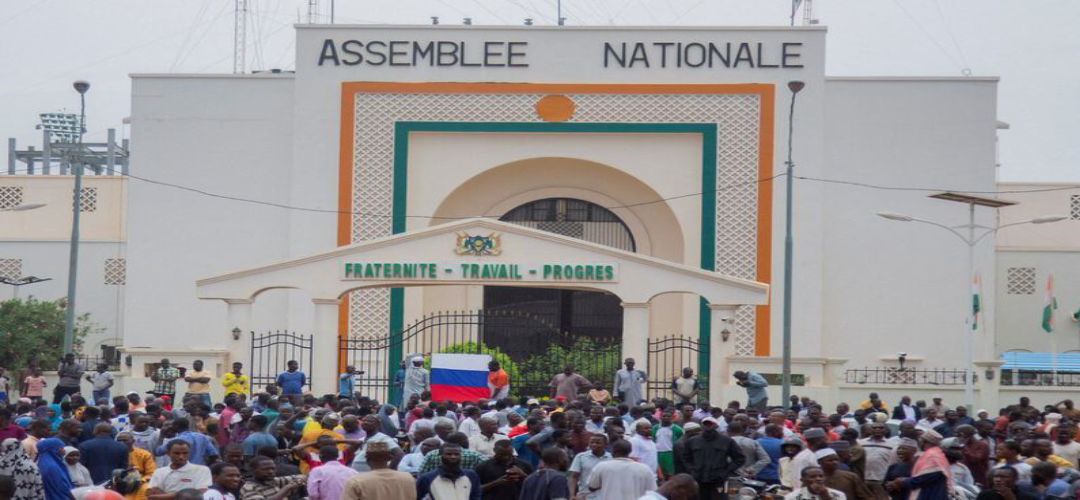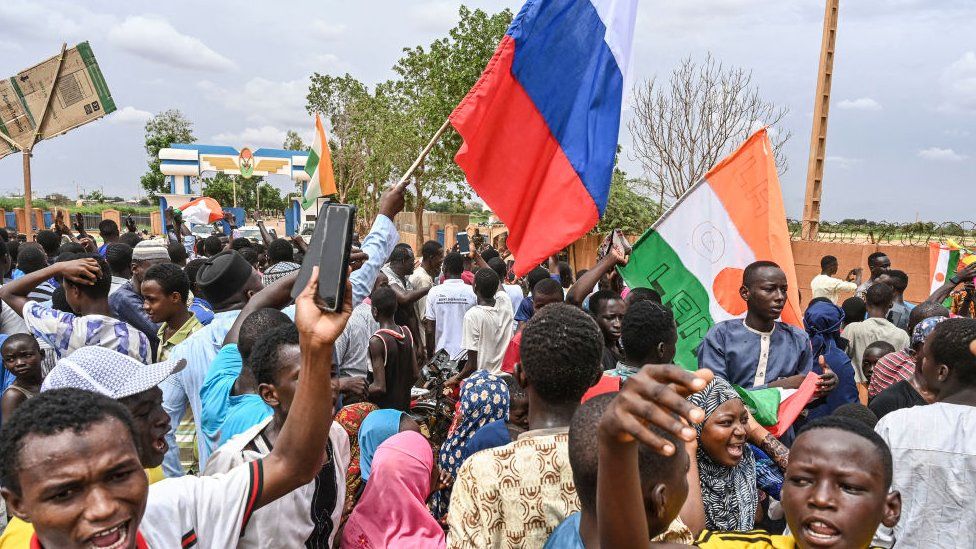Kremlin Taking Over Western Africa?
August 12, 2023 | Expert Insights

On the 28th of July, Niger’s streets were filled with hundreds of youngsters waving Russian flags and shouting slogans like “Long live Putin!” and “Wagner”. General Tchiani appeared on national television and proclaimed himself the new leader of Niger. All this happens while the leaders of most of the rest of the continent are in St. Petersburg attending the Africa-Russia summit.
This is the seventh coup that has taken place in the region over the last three years, pushing countries away from the West and towards Moscow.
What is happening in Niger and the Sahel? Is this Russia's strategy to hit back against the stiff-arming by NATO following the Ukraine conflict? Is the Kremlin channelising the hatred the citizens of Francophone Africa have for their erstwhile tormentors as French corporates, under the shadow of their nation's military, vie with China and the U.S., to take away precious natural resources, including uranium? Are we witnessing the return of Moscow to a continent where for almost 30 years, it held sway over a vast stretch at the peak of its power as the USSR?
Background
Niger is one of the largest yet poorest nations in the Sahel region of Western Africa. A former French colony and the largest exporter of uranium to France. Niger, like its neighbours, has remained poor despite its abundant resources. This can be attributed to political instability (and wholesale corruption at top echelons) and the dangers of the Islamic insurgent groups linked to Boko Haram, al-Qaeda, and Islamic State. These groups are particularly active in the tri-border region between Mali, Niger and Burkina Faso.
While Mali and Burkina Faso recently underwent their own coups, Niger seemed politically and economically stable in a region swept by coups d'état and jihadist violence. They even secured a financial and social development pledge from France and the EU.
More than half of the uranium ore produced from Niger is used to fuel French nuclear power facilities. It also accounts for around 24 per cent of uranium imports into the European Union, making Niger an extremely important asset for the EU and France. France invested heavily in Niger and made sure it held a dominant hand. But this could change faster than anyone in Paris realises.
General Abdourahamane Tchiani, the chief of the Presidential Guard since 2011 and the proclaimed leader of the military junta, called the bloodless coup necessary to avoid "the gradual and inevitable demise of the country due to the rising insecurity and a lack of economic growth." However, other issues precipitated the latest coup d'état.

Analysis
President Bazoum, the elected President of Niger, had recently begun making changes in the ranks, moves that may have antagonised the military. Reports indicated that the President was planning to reorganise the elite Presidential Guard, including probably putting Tchiani out to grass. An alert Tchiani beat him to the punch.
However, the spontaneous mass affection displayed for the dreaded Wagner Group, still licking their wounds somewhere in the backwaters of Belorussia, has deeper roots.
Located between the Sahara Desert to the North and tropical Africa to the South, the Sahel region is spread over a vast area stretching from Senegal to Eretria. Facing extended periods of droughts and violence and conflicts, it is one of the world's poorest regions. Extremist Islamic groups found it fertile ground to preach their brand of radical Islam soon after most countries in the region gained independence in the 1960s. As the influence of the armed Islamist groups grew, their spread transcended poorly guarded national borders, posing a serious threat to the entire region. The West, France, the UN, the AU and even the ECOWAS have vainly tried to stem the tide, but all efforts appear futile. The people's frustration, because they are at the wrong end of the stick wielded by the insurgents and the security forces, is now clearly boiling over.
Mali and Burkina Faso overthrew French-backed governments with the alleged help of the Kremlin and Wagner, and Niger followed in the same footsteps. This suggests that some people in Niger believe their military, supported by Russia and the private military contractor, Wagner group, would do a better job of fighting the insurgents.
Out of favour Wagner boss, Prigozhin has reportedly denied being behind the takeover (apparently, he has many other things to worry about!), but a slight nudge from Kremlin cannot be ruled out. In a statement attributed to Prigozhin, it is being claimed that Wagner offered the mercenary group’s services to bring order to the streets of Niger.
The Sahel region has seen seven coups in the last three years, with each coup shifting countries away from the West and toward Moscow. The West, in general, and France, in particular, are branded as enemies. There is no evidence of Russia's involvement in the Niger coup, but there is little doubt that Moscow benefits from what is going on. It is gaining new authoritarian partners in West Africa, making the area a new theatre for Putin to battle the West.
Considering that Niger holds the world's seventh-largest Uranium deposits, Russia, with its extensive experience and expertise in the nuclear industry, can capitalise on this opportunity by offering advanced technology, infrastructure development, and investments in the uranium sector. Moscow can then secure its supply chain and establish long-term economic cooperation with Niger.
The coup in Niger has the potential to do what Moscow's imposition of war in Ukraine has not: decisively endanger two-thirds of France's energy supply and one-fourth of the European Union's energy supply. Niger’s uranium production occurs from the open-pit operations of SOMAÏR (Société des Mines de l’Aïr). SOMAÏR is 63.4 per cent owned by French company Orano, which could potentially come under Moscow’s control.
To help with all of this, there is also evident hate in the minds of the people of Niger against their former coloniser, France. "I'm pro-Russian, and I don't like France. Since childhood, I've been opposed to France. They've exploited all the riches of my country, such as uranium, petrol and gold. The poorest Nigeriens are unable to eat three times a day because of France," said a local businessman in a BBC World Service programme.
Assessment
- This is not just another coup orchestrated by yet another power-thirsty general; it goes much deeper. Niger is the final domino of the French domination in the Sahel to fall.
- Apparently, in a smart move, the Kremlin is flowing into the existing power vacuum in Western and Central Africa. This could make things difficult for the West, even while the sanctions cut deep into the economic entrails of Russia.
- Evidently, all the time and money that NATO, the UN, and the EU expended in training and equipping the militaries of the Sahel has gone down the drain. A better approach has to be sought to incentivise them rather than abandoning the region to the mercies of the Wagner Group. This is not a zero-sum game; the lives of millions are at stake.








Comments